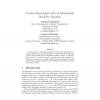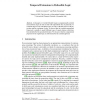605 search results - page 11 / 121 » Dealing with logical omniscience |
FSS
2006
13 years 7 months ago
2006
In this paper we investigate the addition of arbitrary independent involutive negations to t-norm based logics. We deal with several extensions of MTL and establish general comple...
CORR
2006
Springer
13 years 7 months ago
2006
Springer
We investigate here concept learning from incomplete examples. Our first purpose is to discuss to what extent logical learning settings have to be modified in order to cope with da...
BMCBI
2011
13 years 2 months ago
2011
Background: Remote homology detection is a hard computational problem. Most approaches have trained computational models by using either full protein sequences or multiple sequenc...
AUSAI
2007
Springer
14 years 1 months ago
2007
Springer
In this paper, we extend Defeasible Logic (a computationally-oriented non-monotonic logic) in order to deal with temporalised rules. In particular, we extend the logic to cope with...
FMCO
2004
Springer
14 years 29 days ago
2004
Springer
Abstract. A temporal logic is proposed as a tool for specifying properties of Klaim programs. Klaim is an experimental programming language that supports a programming paradigm whe...


